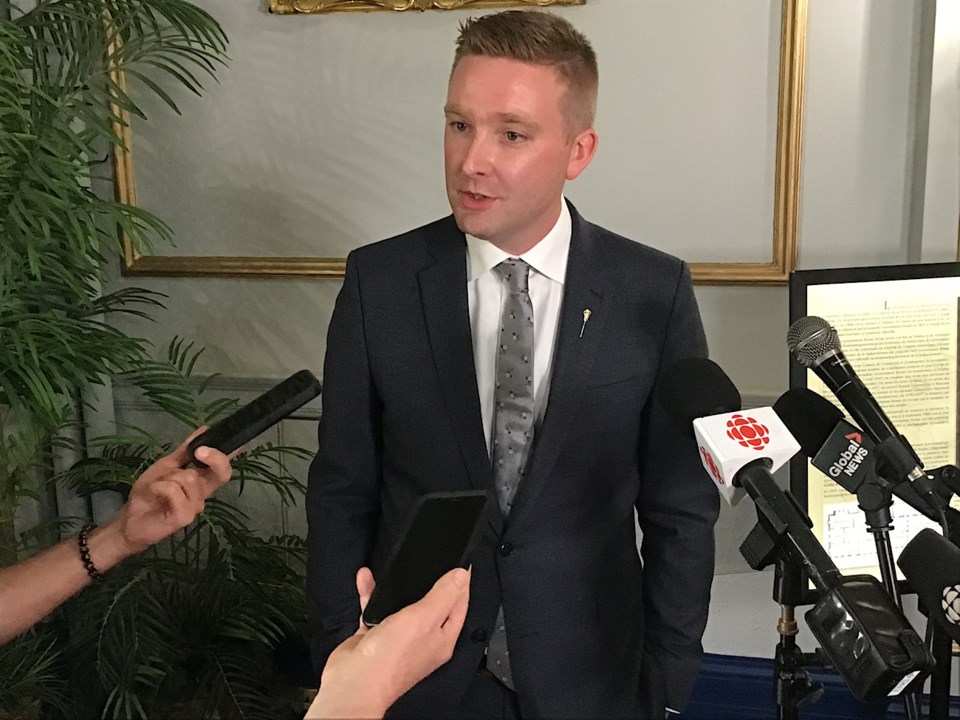REGINA - Saskatchewan's new Minister of Education had no qualms about taking on the portfolio following a major cabinet shuffle on Tuesday.
“I love a challenge,” said new Education Minister Jeremy Cockrill when asked by a reporter if perhaps he felt he was being thrown into the fire in Education.
That question was in reference to the changes the government had announced the week before requiring schools to seek parental consent for name and pronoun changes of students under age 16. It was pointed out that this policy was receiving national attention.
“Why are we getting national attention on this policy? Well, it’s because there’s broad support across the country for this policy around parental rights and inclusion,” Cockrill responded. “We welcome that, because again as a government we believe that parents should be at the centre in education.”
Cockrill's move was among several cabinet changes announced Tuesday by Premier Scott Moe. The changes see three of the highest-visibility and most talked about files going to new ministers.
Cockrill, who is MLA for The Battlefords, takes over Education as his predecessor Dustin Duncan moves over to Minister for Crown Investments Corporation replacing Don Morgan.
Meanwhile, Rural and Remote Health Minister Everett Hindley now takes over the Health portfolio from Paul Merriman, who himself is replacing Christine Tell at Corrections, Policing and Public Safety. Tell is moving over to Environment while Estevan MLA Lori Carr moves over to Highways.
The education portfolio is seeing a host of issues right now, on such matters as school division funding as well as labour negotiations with the Saskatchewan Teacher's Federation on a new collective agreement.
But the lion's share of questions Cockrill faced Tuesday were on the recently announced parental consent policy. In his answers Cockrill showed no indication that the government would back down, or pause the rollout as the Saskatchewan School Boards Association had called for last week.
Cockrill said there was wide support for the policy change requiring parental consent, saying he had heard about the issue when visiting all 61 constituencies, and also from all government MLAs.
“Inevitably in community after community after community, including my own, the topic of education comes up. And we hear from parents who are dealing with specific situations, or maybe just more general situations that want to be more involved in their child’s education. I think what this policy does is it ensures that there is similar policies, a consistent policy in all 27 school divisions around the province and ensures that the default position is that parents have an opportunity and an ability to be included.”
He said MLAs were hearing not just from one or two constituents, but “numerous constituents” on the issue.
Cockrill did acknowledge there might be situations where “maybe a child doesn’t feel safe to tell their parents. And that was clearly outlined by Minister Duncan when the policy was introduced last week. We’re going to make sure that there are supports wrapped around that student… and bring them to the point where they are comfortable.”
Cockrill added they are still working on the implementation of the policy. He said he “looks forward to engaging with our staff here in Regina and around the province as well as 27 school divisions and understand how we can support implementing this policy in school divisions.”
Cockrill was also asked what would happen with the return of schools next week. He responded that there were “robust supports in schools all around the province whatever community you’re in.”
“Obviously as well, school is starting next week and I look forward to getting in the trenches here with my staff, as well as school divisions around the province to make sure we are providing those supports where they’re needed.”
New Health Minister Hindley also ended up facing a number of questions about the new education policy, in connection to his own new portfolio. He responded that “we want to ensure (students) have access to all the necessary supports, whether it’s at school or elsewhere. And we have a number of programs in our schools either funded by the Ministry of Health, or by the Ministry of Education.”
Hindley was also asked about the province’s move to suspend outside organizations from presenting in schools on sex education. When asked who was best to teach kids on such topics as prevention of STIs or preventing sexual assault, Hindley responded “I believe that would be up to the teachers, but also health care providers as well.”




